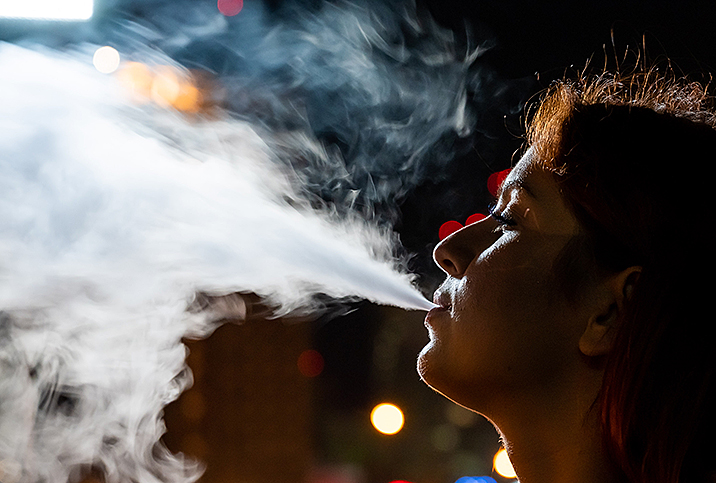Some Turn to Nicotine As an Alternative Nootropic

America's contentious relationship with tobacco isn't going to burn out anytime soon. With access to flavored vapes, pods and pouches, all readily available to anyone with a convincing I.D., it's safe to say nicotine's chokehold on our society may be tightening.
Within the larger pool of smokers have emerged a subgenre of nicotine fans who turn their nose up at cigarettes in lieu of the supposed "brain-enhancing" boost from nicotine gum or pouches.
These are the people who use nicotine as a nootropic.
What is a nootropic?
Nootropics are classified as a supplement or drug purported to improve cognitive function—like the organic compound creatine, or a nootropic brand-name product like Alpha Brain. Despite myriad studies and reviews that report that the evidence is too inconsistent to prove something like Bacopa monnieri (one of the many ingredients in Alpha Brain) actually helps concentration, smart drugs are on the rise.
Jack, a 23-year-old Redditor, has noticed what he described as "beneficial nootropic effects" from the cigars he's been smoking since age 20.
"For me, cigars are mainly a hobby," Jack said. "Sometimes I'll intentionally smoke while doing schoolwork for the focus-enhancing benefits. I feel like nicotine helps with my ADHD more than my medication—[it] centers my mind and quiets the internal chatter. However, due to the addictive nature of nicotine, I only use cigars to help me focus."
Jack explained that he used to rely on nicotine pouches during prolonged periods of study, but prefers cigars for the centering feeling they provide him.
The addictive allure
"Smoking is bad, vaping is bad," said another Redditor, reallivealligator, who we'll just call Greg. "But nicotine is great."
Greg usually starts his days with a pouch of a smokeless, tobacco-free product like Zyn, which delivers 3 milligrams of slow-release nicotine into the system for as long as the pouch is wedged between a user's gums and lips.
"It's highly addictive," Greg added. "If I don't get it, my body and mind yearn for it."
Lately, the physical and mental withdrawal symptoms have reached the point that Greg is starting to question the cost-benefit balance of using nicotine as a nootropic.
Nicotine's mood-boosting properties are typically reserved for people with a history of nicotine use and degrade as the person's tolerance rises—which happens pretty easily. The brain is absolutely loaded with nicotine receptors, which is why a buzz hits so quickly and can have such a wide range of effects.
'At higher doses, it's a poison, and at lower doses, it's still addictive.'
Inside everyone's head sits an area of the brain widely regarded as the "mechanism for addiction," called the nucleus accumbens. There, you'll find dopamine neurons loaded with receptors that—when activated by nicotine—release the "feel-good" hormone dopamine. The problem is, activating those receptors means indulging in one of the various methods of nicotine delivery systems, such as cigarettes or vapes.
"You have to remember that nicotine is a toxic alkaloid that is addictive," said John Dani, Ph.D. Best known for his profound research on the topic of addiction, Dani is the chair of the department of neuroscience in the Perelman School of Medicine and the director of the Mahoney Institute for Neurosciences (MINS) at the University of Pennsylvania.
"At higher doses, it's a poison, and at lower doses, it's still addictive," he advised.
New-tropic or old topic?
According to Dani, the use of nicotine as a nootropic isn't as new of a concept as most people might think, especially as the past 20 years have churned up some pretty iffy results of nicotine causing the cognitive boost—or "smooth head-rush"—reported by various users of the Nootropics subreddit.
Some studies sound surprisingly promising—one concluded that "nicotine has cognitive-enhancing effects, including improvement of fine motor functions, attention, working memory and episodic memory." However, other studies indicate the exact opposite with just as much conviction.
There's a lot of research about nicotine's effects on memory, but anecdotal evidence like this doesn't compare to the confirmed downsides of nicotine.
"Nicotine is called the great leveler," Dani said, meaning those dependent on nicotine will smoke a cigarette or take a hit of JUUL as a morning energizer just as easily as they'll perform the exact same routine at the end of the day to unwind.
"The addictive properties of gum or the patch are lower than cigarettes, but it's still an addictive drug," Dani said. "If you find the patch to be stimulating during study periods, you might eventually find that studying eventually becomes hard without the patch."
Like most of the supposed brain-enhancing herbs or supplements on the market, the evidence supporting nicotine's nootropic properties are way too varied and inconclusive to risk your health. Want to boost your energy without putting a toxic chemical into your body?
Giddy Notice: Our medical experts have informed us that few supplements of this nature have been approved by the Food and Drug Administration (FDA). That is to say that statements and claims made about the efficacy or possible health benefits of these unapproved supplements have neither been evaluated nor reviewed by the FDA for safety and effectiveness. Furthermore, any statements or claims regarding the supplements are not intended to diagnose, treat, prevent or cure any disease. Our medical experts advise that before you use a supplement in any way, you first consult with your healthcare provider to ensure you have full knowledge of appropriate dosages, if any, as well as any potential side effects or interactions with any prescription medications you're already taking.


















